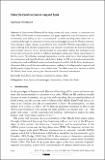State de-construction in Iraq and Syria
Abstract
In International Historical Sociology, states and states systems co-constitute each other. While IHS focuses on state formation, this paper argues that state de-formation, and in its extremes, state failure, is also “co-constituted.” In Syria and Iraq, state failure was co-constituted through an interaction between internal insurgencies and the Western interventions aiming at regime change. Iraq and Syria were created by Western imperialism as weak states suffering from identity fragmentation and pervasive irredentism. Ba’thist state builders used populist versions of neo-patrimonialism to consolidate regimes but excluded social forces were permanently poised for rebellion and regime decline gave them opportunities to bid for power. Nevertheless, external intervention was the extra factor that initiated state de-construction and tipped both into failed states. In Iraq the US invasion deconstructed the existing state and established a sectarian based regime bound to fail. In Syria, shrinking inclusiveness led to revolt but external intervention, making it a battleground of regional and global powers, tipped the country into a failed state. Two failed states left a vacuum in which IS arose, inviting yet a further round of external intervention.
Citation
Hinnebusch , R 2016 , ' State de-construction in Iraq and Syria ' , Politische Vierteljahresschrift , vol. 57 , no. 4 , pp. 560-585 . https://doi.org/10.5771/0032-3470-2016-4-560
Publication
Politische Vierteljahresschrift
Status
Peer reviewed
ISSN
0032-3470Type
Journal article
Collections
Items in the St Andrews Research Repository are protected by copyright, with all rights reserved, unless otherwise indicated.

